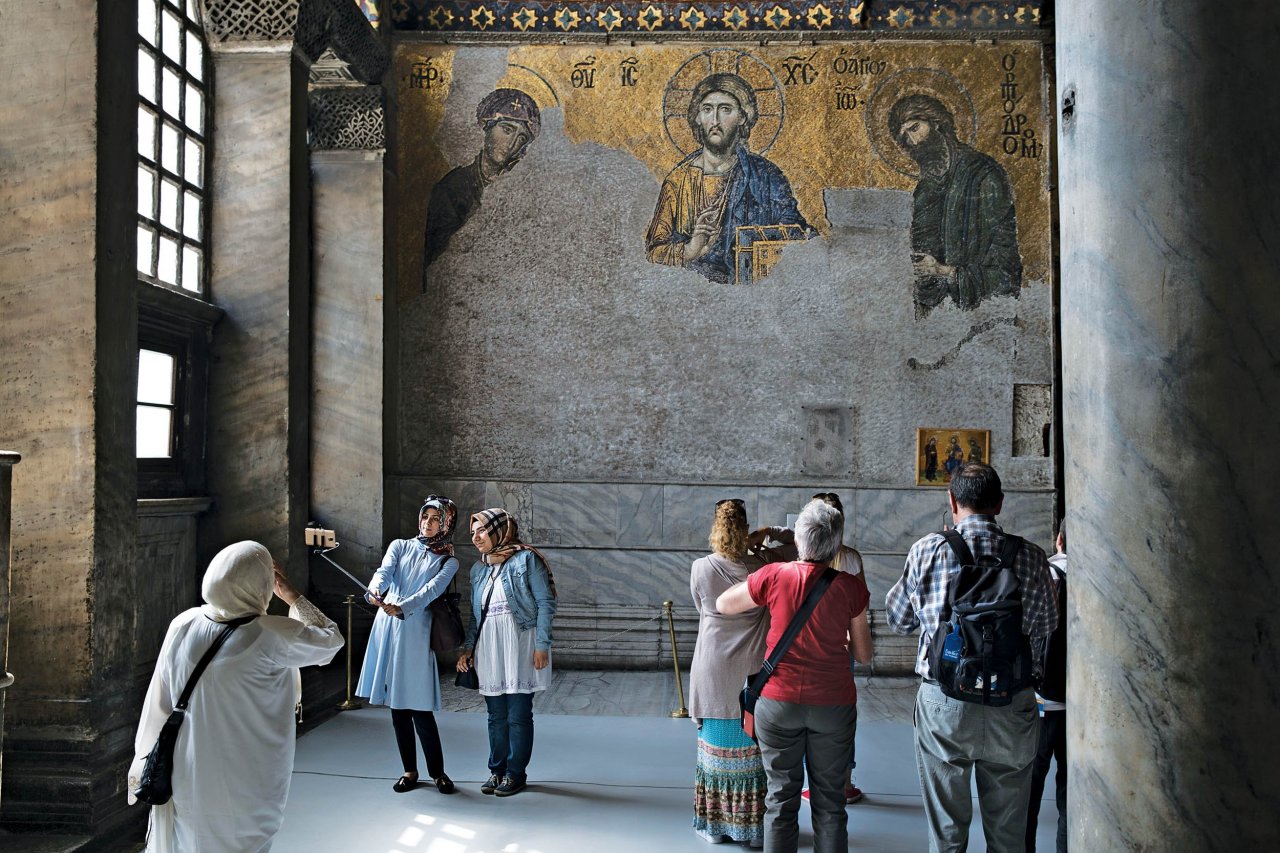
Empires have risen and fallen, but the dome of the great basilica remains, dominating the skyline of Istanbul for the past 14 centuries. Built by the Roman emperor Justinian in 532 as the Church of the Holy Wisdom, the Hagia Sophia served as the principal church of Eastern Christianity for 916 years. When the Turkish Sultan Mehmet II captured the city in 1453, he stopped at the monumental porch and stooped to scatter dust on his turban as a gesture of humility before Allah the Victory-Giver.
On Mehmet's order, the church became the mosque of Ayasofya (the Turkish spelling), a symbol of the triumph of the Ottoman Turks and of the supremacy of Islam. In 1935, the founder of modern Turkey, Mustafa Kemal Atatürk, ordered Ayasofya opened as a museum, as a symbol of the secular, modern republic he was forging from the ruins of the Ottoman Empire.
"Atatürk made the Hagia Sophia a monument to what Turkey could become," said Antony Eastmond, A.G. Leventis reader in the history of Byzantine art at London's Courtauld Institute of Art. "By turning it from a mosque into a museum, he made it a place for all people."
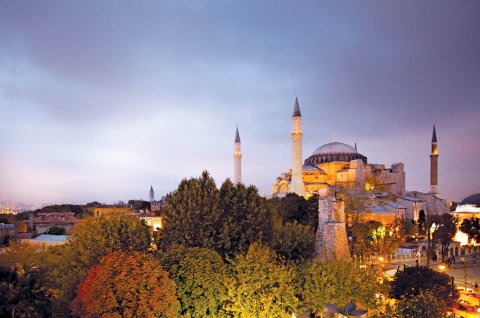
Now the Hagia Sophia (the usual English spelling) has once again become a symbol, this time of the very contemporary battle for the soul of Turkey between Islamists and secularists. Vocal religious-conservative activists, some with links to the ruling Justice and Development (AK) Party, are pressuring the government to re-consecrate the site for Islam. One day in late May, as busloads of bemused tourists looked on, a crowd of more than 1,000 protesters gathered in front of the museum carrying placards saying, "Ayasofya must be reopened as a mosque" and "May our lives be sacrificed for Islam." Many of the men wore beards and white skullcaps; the women modeled a very Turkish mix of the stylish and religious, sporting silk headscarves and expensive sunglasses while brandishing black and green flags printed with Koranic verses.
"Sultan Mehmet the Conqueror brought peace to people of all religions," says Haci Murat Uzgur of the Anatolia Youth Association, a conservative nongovernmental organization that last year collected 15 million signatures supporting conversion to a mosque. "Hagia Sophia is the symbol of peace, justice and tranquility for all of humanity." But many onlookers at the rally were more alarmed than pacified. "Where are these people from?" asked Mustafa Sonmez, the proprietor of a historic kebab house opposite the dome. "They want to make our country into Iran."
The conversion of the Hagia Sophia would be the most powerful symbol yet of a decisive turn by Turkey away from the West and toward Islam. And the campaign for conversion is gathering strength. In April, after Pope Francis labeled the mass killings of the Ottoman Armenians in 1915 as "the first genocide of the 20th century," the grand mufti of Ankara, professor Mefail Hizli, predicted that "the pope's remarks will only accelerate the process for Hagia Sophia to be reopened for [Muslim] worship." He also denounced the pope as a "modern crusader."
Around the same time, a Muslim cleric recited the Koran in the Hagia Sophia for the first time in 85 years. The occasion was the opening of a new exhibition of calligraphic work in devotion to the Prophet Muhammad, called "Love of the Prophet." All the leaders from Turkey's religious establishment gathered to mark the symbolic moment. And ever since 2012, Turkey's chief mufti has recruited Istanbul's most gifted muezzins to read the five-times-daily call to prayer from a small Islamic sanctuary on the grounds of the Ayasofya Museum, transmitted especially loudly through speakers on its stumpy brick minaret.
Turkey's culture wars are coming to a head with June 7 parliamentary elections that will determine whether it changes its constitution to a presidential one. Such a move could give the increasingly autocratic President Recep Tayyip Erdogan sweeping new powers. If his party wins a super-majority of 66 percent in the parliament, that would allow him to change the constitution. More likely, though, support for his AK Party will slip. Polls show that voters are dissatisfied with Erdogan's handling of the economy. Under the AK Party, Turkey has enjoyed a sustained economic boom unrivaled in the region or in the West. In 2002, per-capita gross domestic product (GDP) averaged $3,600, just ahead of Equatorial Guinea, but by 2013 it had tripled to $11,000. Turkey is now comfortably among the world's top 20 economies, with annual GDP of more than $800 billion.
But growth has fallen from 4 percent in 2013 to 2.9 percent last year—still far ahead of the stagnant European Union but too slow for many voters. Erdogan has also lost support among Turkey's 15 million strong Kurdish population, who have defected in droves to the pro-Kurdish People's Democracy Party, which is expected to pass the 10 percent threshold to enter the parliament and spoil Erdogan's dream of creating a powerful Russian- or U.S.-style executive presidency.
Over his 13 years in power, Erdogan—who was jailed in 1999 for reading a banned religious poem during a speech—has scrapped a ban on Islamic headscarves in universities, removed restrictions on religious schools and tightened laws on alcohol. A decade ago, Turkey was obsessed with joining the European Union. Now its diplomacy is largely focused on leading the Muslim world. So far, Erdogan has held off from publicly backing calls for the conversion of Hagia Sophia. But for many Turks—including Deputy Prime Minister and AK Party co-founder Bülent Arinç, who already refers to the "Hagia Sophia Mosque"—the conversion of the monument is the logical next step in the inexorable Islamization of the Turkish Republic. "Ayasofya is a symbol for the Islamic world and the symbol of Istanbul's conquest," says Salih Turan, head of the Anatolia Youth Association. "Without it, the conquest is incomplete."
Clearly, the Hagia Sophia campaign is not just about Islam—it's about Turkish nationalism too. For most of the 20th century, Western-oriented Turks scorned their country's imperial past, and the legacy of Islam. "I wish all religions at the bottom of the sea," Atatürk told an interviewer in 1926, denouncing the last sultan as "a weak ruler who needs religion to uphold his government.... My people are going to learn the principles of democracy, the dictates of truth and the teachings of science. Superstition must go."
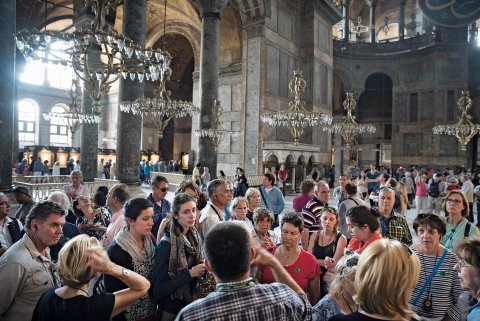
Erdogan's government has not only reversed the republic's aversion to Islam but also glorified Mehmet the Conqueror and the Ottoman past. "Conquest means the removal of shackles on people's hearts," Erdogan told a rally on the anniversary of the fall of Constantinople on May 29 last year. "With conquest came civilization."
Erdogan has made a point of meeting visiting heads of state at his new presidential palace in Ankara, flanked by fiercely mustachioed reenactors dressed in medieval Turkic armor and weaponry. A 2012 film depicting the dramatic siege of Constantinople, Conquest 1453, has been a huge box-office hit, and so has Magnificent Century, a Tudors-style TV drama about the 16th century Ottoman Sultan Suleiman the Magnificent. A new "Panorama 1453" museum opened in 2009 near the spot where the Ottoman forces broke through the city's walls and killed the last Byzantine emperor, Constantine XII, and has also been enormously popular.
The Hagia Sophia controversy holds a mirror not just to Turkey's growing Islamism and nationalism but also to a growing divide between the cultural values of conservative Anatolia—the AK Party's voter base—and those of godless, cosmopolitan Istanbul. This was the fault line that sparked a three-month standoff in 2013 over plans to build a mosque and shopping mall in downtown Istanbul's Gezi Park. Hundreds of thousands of people took to the streets, and the government lost control of the city center for weeks. The protests were eventually crushed by a massive show of police force that left 11 dead and over 8,000 injured.
The AK Party has also incensed secular Istanbul residents by cracking down on alcohol being served at street-side restaurant tables or near mosques or schools. The AK Party leadership has also proposed a vast mosque on Camlica Hill, the highest spot in the city, and another on Yassiada, an abandoned prison island where former Prime Minister Adnan Menderes was sentenced to death after a military coup in 1960.
"This is a very proud city—we are ready to fight for it," says Salih K., a member of the Istanbul graffiti-art group Sokaklar Bizimdir (which translates as "The Streets Are Ours"). With his skater sneakers and baseball cap, Salih K. would not look out of place in Berlin or Los Angeles. Like many of the protesters who braved police tear gas in the Gezi protests, he feels that the identity and freedom he fought for is under threat from a conservative, Middle Eastern ethos imposed from Ankara. "If these guys want a place to pray, fine," says Salih K. "Let them pray back home, in the village. Don't bring all this stuff here to the city. We want to live in the 21st century."
The debate also highlights another worrying development: Turkey's increasing authoritarianism and intolerance for dissent. In May 2014, in response to a draft law calling for the conversion of Hagia Sophia to a mosque, tabled by AK Party dissident deputy Hami Yildirim, a group of 28 Turkish and foreign academics wrote an open letter to the government decrying the proposal as "insensitive" and "misguided," and 1,200 Ottoman and Byzantine experts from around the world added their signatures. Ever since, says one of the original signatories, who requested anonymity, "I have been subjected to threats and nasty anonymous letters.
"There is a culture of fear over telling the non-Muslim past of this country," says the academic, a world-renowned Byzantinist. "These people fear that this Christian past will somehow interfere with the ability of people to be good Muslims." Several of the signatories say they have had promotions blocked and have been shunned by fellow academics. "Our ability to speak out is being silenced," says one. "These attacks have become the norm."
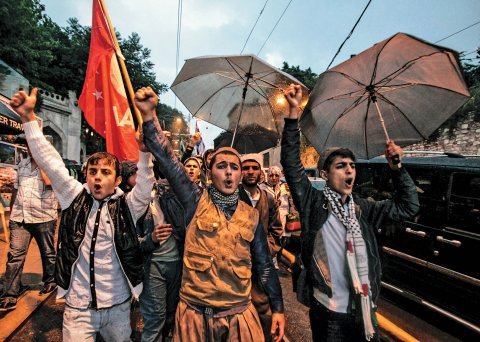
The debate has also pitted Turkey's conservative politicians and clerics against the world's archaeological and museum community, as well as UNESCO, which lists Hagia Sophia as a World Heritage Site. The museum is Turkey's most-visited monument, drawing around 3.3 million visitors in 2012. "Now the building is open to all regardless of religion or gender," says the Courtauld Institute's Eastmond. "If converted to a mosque, there would be different access for men and for women. When it was turned into a museum, both the Christian and Muslim aspects [of the Hagia Sophia] were represented."
In particular, the opening of the museum allowed the church's magnificent mosaics, which are among the finest surviving examples of medieval Byzantine art, to be put on display for the first time in half a millennium. (The mosaics, covered up in the 15th century, were rediscovered by Swiss restorers in the 1840s but whitewashed over again at the insistence of the Ottoman authorities.) These would have to be screened or covered if the site became a mosque again.
Such a radical makeover has happened twice already in recent years. Another important 12th century Byzantine church, the Hagia Sophia in the Black Sea city of Trabzon, was turned into a mosque in 2013, resulting in priceless frescoes being covered up and the medieval mosaic floors being concealed under carpets, to the horror of historians and the disappointment of tourists. The same fate has befallen another Hagia Sophia, this time in the northeastern Turkish city of Iznik. The city was formerly known as Nicaea and is where bishops from across the Roman Empire gathered for the First Ecumenical Council in the year 325 and formulated the Nicene Creed, which is repeated at every Christian Mass. And this month the local council of the Enez district of Edirne—the ancient Adrianopolis—decreed that the ruins of a third Hagia Sophia, also dating to the 12th century, are to be renovated as a mosque, overturning earlier plans to restore it as a museum.
"The core of these monuments is Byzantine. They were designed and built in Byzantine times, and there are architectural features that are lost when they are transformed into mosques," says an Istanbul-based scholar, who asked for anonymity because of fear of reprisals. "This is a way of distorting architectural authenticity of the buildings."
The U.S. Commission on International Religious Freedom, a bipartisan advisory panel set up by Congress, has warned that "opening Hagia Sophia as a mosque would clearly be a divisive and provocative move" that could threaten Turkey's international standing and reopen grievances over its mistreatment of Armenian and Greek Christians over the past century. Mostly, though, international scholars hate the idea of converting Hagia Sophia because it emphasizes one layer of the city's history over all others. "The richness of this city is that it is composed of many historical levels; Byzantium is one of them," says Alessandra Ricci, an archaeologist who has spent a decade excavating a major Byzantine monastery in the Istanbul suburb of Kucukyali.
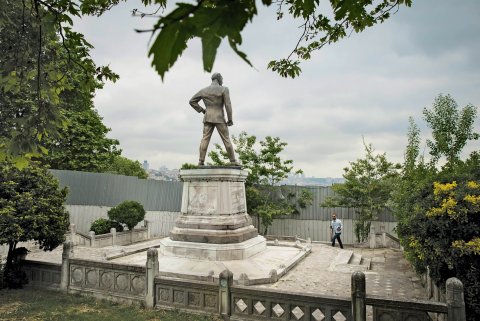
Even those who are lobbying for the conversion of Istanbul's Hagia Sophia acknowledge that their campaign is about symbolism, not about providing places of worship. Istanbul boasts more than 3,000 mosques—and the closest one to the Hagia Sophia, the vast 17th century Sultanahmet mosque, is almost empty of worshippers. Bartholomew I, the ecumenical patriarch of Constantinople and the senior patriarch of all Orthodox churches, has a flock among Istanbul's dwindling Greek Orthodox community that numbers just 5,000. But he is head of a worldwide expatriate Greek community of over 300,000 and believes his church has the best claim to ownership of the basilica. "The Hagia Sophia basilica was built in testimony to Christian faith, and if it is to be returned to worship, it cannot be any other than a Christian one," Bartholomew told reporters earlier this year.
Some Turkish commentators have suggested that some areas of the building be designated for different faiths. "People like me would like to see the shrine reopened to worship as a mosque/church, where both faiths can share the place for their respective rituals, with respect to each other," says Mustafa Akyol, author of Islam Without Extremes: A Muslim Case for Liberty. "But I doubt that the 'New Turkey' of Erdogan will foster such a liberal ecumenism. It rather seems to be engaged in a defiant triumphalism."
Polls indicate Turkey's coming elections are likely to dampen Erdogan's super-presidential ambitions—and may even see his party yanked into a coalition for the first time. But calls from religious conservatives to convert the Hagia Sophia will probably continue. That is, until Turkey learns to come to terms with its heritage, which means steering a line between suppressing Islam, as Atatürk did, and promoting it at the expense of all the other cultures. "After all," writes blogger Nervana Mahmoud, "we cannot change history; we can only learn from it."
With additional reporting by Sila Alici














